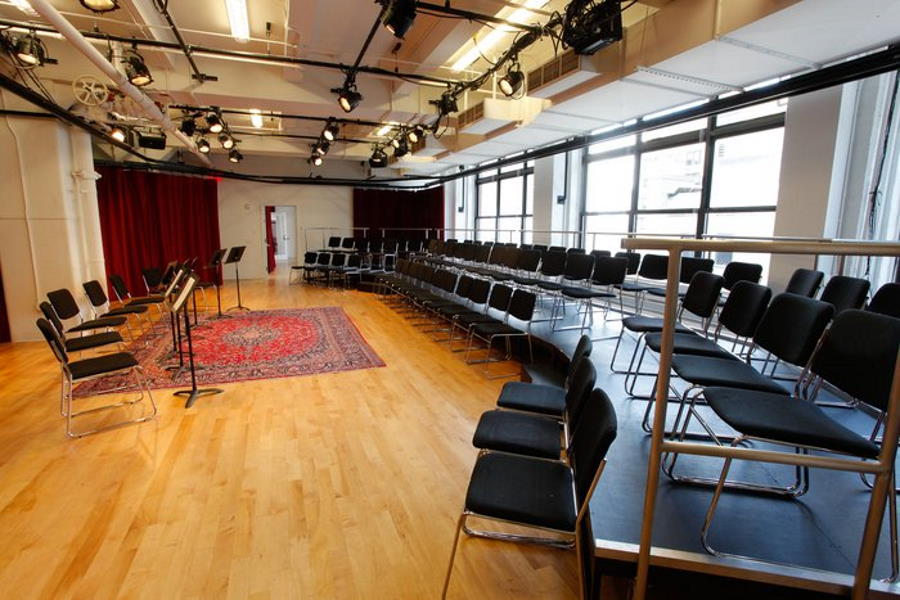NEW YORK CITY: In a stunning blow to playwrights and play development in the U.S. and worldwide, the prestigious new-play lab the Lark has announced that it will close its doors, though not before it works with “peer institutions to re-home existing Lark programs and fellowships.” According to a press release, the decision to shutter the 27-year-old play development mainstay was a “unanimous yet painful conclusion” of the organization’s board after “many long months of responding to pandemic-related crises and seeking paths to sustainability.”
In early 2020, the Lark’s founder, John Clinton Eisner, began to plan his retirement and transition out of his active role in the organization. When the COVID-19 pandemic and the attendant lockdown began, the Lark appeared to soldier on. Eisner publicly announced his departure in February 2021, and a week later director and new-play advocate May Adrales (she/her) was named as his successor, to lead alongside executive director Stacy Waring (she/her).
But behind the scenes all was not well with the organization’s finances, as its longtime board president, Colin Greer (he/him), acknowledged in an interview. Contributing to a growing crisis at the Lark, he said, Waring went on medical leave not long after Adrales’s hiring, leaving her solely in charge of a small, over-stretched staff. As the organization struggled to meet pre-pandemic funding levels, Greer said, the landlord for the Lark’s midtown space threatened to nearly double the rent. “It was really a perfect storm,” he said.
Greer, who had been with the Lark since before its founding, when he and Eisner kicked around the idea for a new-play initiative over breakfast at a Hungarian restaurant, called its ending “enormously sad,” and emphasized that the board and staff had worked tirelessly hard for the last six months to find a solution that would allow the Lark to continue, to no avail.
For her part, Adrales wrote in an email: “When I excitedly stepped into this role six months ago, I did not know that this great organization, my first artistic home of 20 years, faced such steep, insurmountable challenges. It is a devastating loss personally but also to the theatre field. I am comforted by my belief that the Lark has never been beholden to a physical place. It is a spirit, a transformation. Our methodologies and philosophies, which empower playwrights to write what they choose, have permeated the theatre landscape. We all have been transformed by the Lark experience, and we will carry all that the Lark taught us throughout its amazing 27 years. We know that its spirit will live on through every person it has touched.”
The Lark’s history and legacy is indeed substantial. As board member and playwright David Henry Hwang said in a statement, “At a time when play development in America risked slipping into formulaic dramaturgy, the Lark was founded to re-empower the playwright’s vision, a philosophy that has now become a best practice throughout the country and internationally. Its mission included centering dramatists from BIPOC, LGBTQIA, and other marginalized backgrounds, which was once also a radical idea but now sets the pace for the field. Plays developed at the Lark have become the new American canon; of the five most recent winners of the Pulitzer Prize for Drama, four were written by Lark playwrights, and two were developed directly in Lark programs. The Lark has succeeded in transforming the American theatre, and its legacy will live on.”
A short list of playwrights who developed work at the Lark includes, in addition to Hwang himself, Katori Hall, Rajiv Joseph, Martyna Majok, Dominique Morisseau, Jen Silverman, Jiehae Park, Lucas Hnath, Mike Lew, Hansol Jung, Lauren Yee, Dipika Guha, Kimber Lee, Samuel D. Hunter, A. Rey Pamatmat, Rehana Mirza, Sam Chanse, Olivia Dufault, Larissa FastHorse, Donja R. Love, Erika Dickerson-Despenza, Susan Soon He Stanton, Leah Nanako Winkler, MJ Kaufman, Tim J. Lord, Matthew Paul Olmos, Zora Howard, and Theresa Rebeck.
Founder John Clinton Eisner states, “We started the Lark because there were so many people with important stories who needed a place to develop their voices and visions. Since then, we helped launch a new generation of outspoken playwrights through artist-centered processes that exploded the theatre’s conception of whose stories are important to tell and how to tell them.”
Founded in 1994, the Lark provided writers with funding, space, collaborators, audiences, professional connections, and the freedom to design their own processes of exploration. The guiding principle of their work was the belief that playwrights are society’s truth tellers, and their work strengthens the collective capacity to understand our world and imagine its future.


